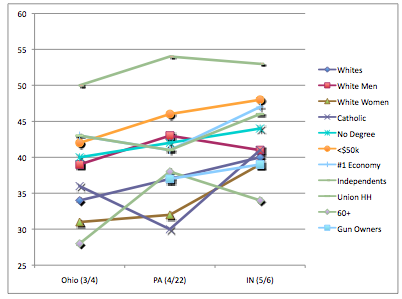So Barack Obama is back. The results on Tuesday did not provide the "game changer" Hillary Clinton so desperately needed. Instead, Obama built on his leads in delegates and the popular vote. His aides pointed to May 20 as the day when he will clinch a majority of elected delegates, essentially becoming the party's presumptive nominee. And that's not all.
In Indiana, Obama improved his support across several key demographics, despite a bruising month of attacks on his pastor, patriotism and populism. Compared to Ohio and Pennsylvania, he generally drew more votes from white women, Catholics, gun owners, households earning under $50,000 annually, voters prioritizing the economy, and voters without a college degree. A Democratic field operative sent in this graph of the progress:

And in Obama's remarks in North Carolina, he spoke about beating back the attack politics that sideline important issues:
Yes, we know what's coming. We've seen it already. The same names and labels they always pin on everyone who doesn't agree with all their ideas. The same efforts to distract us from the issues that affect our lives by pouncing on every gaffe and association and fake controversy in the hope that the media will play along... This is what they will do - no matter which one of us is the nominee. The question, then, is not what kind of campaign they'll run, it's what kind of campaign we will run. It's what we will do to make this year different. I didn't get into race thinking that I could avoid this kind of politics, but I am running for President because this is the time to end it.
Ari Melber writes for The Nation, where this post first appeared.